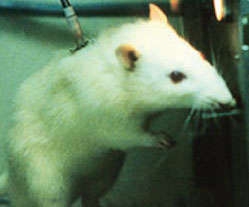Laboratory animals raised in isolation may provide useful subjects for studies of attention-deficit hyperactivity disorder (ADHD) and other conditions characterized by impulsive choice. Dr. Jennifer Perry of the Minneapolis Medical Research Foundation and Dr. Michael Bardo of the University of Kentucky found that rats make more impulsive choices after being raised alone in bare laboratory cages than when raised in group housing equipped with novel objects. Treating rats from the two contrasting environments with medications for ADHD produced results parallel to those seen in people with and without ADHD: Injections of the ADHD medications d-amphetamine or methylphenidate moderated the excess impulsivity of the animals reared alone. In contrast, among animals reared in the enriched environment, the drugs did not decrease impulsive choice, and d-amphetamine actually increased that trait. The researchers plan to use rats raised in isolation to explore the neurobiology that links impulsivity and vulnerability to addiction.
Behavioural Brain Research 193(1):48-54, 2008. [Full Text (PDF, 614KB)]

